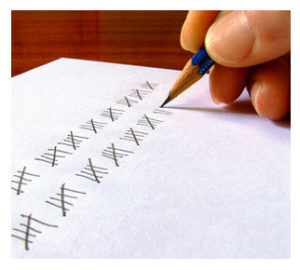Narcissism. My oh my, we do so love to slap the narcissist label on our nasty exes, our obnoxious bosses, and a long list of other Least Favorite People.
 Master Manipulators? That’s a great labeling choice, too. Who hasn’t had to fend off psychological manipulation at home or in the workplace?
Master Manipulators? That’s a great labeling choice, too. Who hasn’t had to fend off psychological manipulation at home or in the workplace?
So what about scorekeeping? Now, there’s a Big Bad Behavior that I find aggravating! Relationship scorekeeping is oft overlooked, dreadfully draining, and a puzzling problem in a variety of contexts.
Is it a sign of narcissism? A tasty tool of the Master Manipulator? What if we find ourselves guilty of keeping score?
Where Reciprocity Ends, Scorekeeping Begins
After a recent relocation, when three new neighbors jumped in to help me out — to adios my trash, break down cardboard boxes, and drag bags of packing peanuts and crumpled newspaper onto the curb — I was blown away by their kindness. Naturally, I thanked them. But afterward, I was hoping to do more.
I made a mental note to bake something for each of them, or to perform some other equally neighborly feat to show my appreciation. To me, this isn’t about keeping score, but a demonstration of how much their help is valued — and it is.
Am I also motivated by knowing I might need an assist in the future? Sure. But that isn’t what’s going on. What is going on… good manners. A polite, appropriate thank you.
So how do we approach these thank you’s that take place over the course of time? Are we creating obligations, or feeling them taking form? What if these thank you deeds start to stack up? What if we feel indebted where there truly is no debt?
Is there an unwritten rule that if someone does you a good turn, it must be reciprocated beyond a genuine thank you? And what if that’s not possible?
Sustaining an injury shortly after moving into my new place, I managed one platter of cupcakes for the gentleman next door, but that was it. My baking acknowledgments were no longer an option.
And I worried. If I was on the receiving end of an assist again, would my neighbors begin to tally the times they helped and I didn’t (or couldn’t) reciprocate? Were our roles reversed, would I?
Tit-for-Tat
What relationship — friendship or romance, casual or otherwise — doesn’t sour under the weight of obligation? Who doesn’t resent the impression that a friend or partner is maintaining a ledger of items he “did” for you, pulling them out to guilt you with them? What if “thank you” is all you’ve got, but it doesn’t seem to satisfy?
What happens when relationships devolve into scenarios of tit-for-tat?
Most discussions on the subject of obligation and manipulation — isn’t that what it is, really? — address the downside of keeping score in love relationships, typically focusing on a partner’s mistakes.
This article on why keeping score kills love speaks to harboring (and tallying) perceived slights and faults. Over time, this brews a toxic mix of silences, misunderstandings, resentment…
Eventually, emotions reach a boiling point and erupt. Disproportionate give-and-take — or perceived disproportionate give-and-take — must be aired and addressed. If not, ultimately, it destabilizes the relationship.
 Another flavor of behavior in this realm isn’t an issue of counting your partner’s “misdeeds” but rather, tallying those positive acts to do with gestures or kindnesses — yours. Realistic or not, you expect an equal number or type of actions on the part of your partner. It’s all very tit-for-tat.
Another flavor of behavior in this realm isn’t an issue of counting your partner’s “misdeeds” but rather, tallying those positive acts to do with gestures or kindnesses — yours. Realistic or not, you expect an equal number or type of actions on the part of your partner. It’s all very tit-for-tat.
Effectively, you’re keeping score. You’re obligating. You’re engaging in “well I did this for you, so…”
Maybe you even say as much.
Some might term that emotional blackmail, though I view it as psychological manipulation. Whatever you call it and whatever the relationship… friend, parent-child, lover… trust me, it’s a turn-off.
Now, let’s be fair. Sometimes, scorekeeping develops out of a legitimate sense that we aren’t appreciated, or that the give-and-take in the relationship is seriously out of balance. Doesn’t that call for a conversation rather than manipulation? Doesn’t it explain an instance or two of mentioning the “I did this for you” list?
On the other hand, one or two mentions does not a pattern make! This is about context, about similar words or behaviors that occur more frequently, squeezing us into a not so cozy corner of obligation.
Obligation? Not Sexy.
Scorekeeping? The “you owe me” approach? Guilting someone you’re supposed to love?
It happens all the time. It happens in the kitchen, the home office, the bedroom. It doesn’t feel good. It isn’t sexy.
So how do you deal with it? Must you accept it? Will getting it out in the open help?
I have found careful, respectful, and gentle communication to help most issues in any sort of relationship. This behavior is no exception, though awareness on the part of the scorekeeper must be keen, and willingness to change must be present. We all know that we can’t change others — we can only change ourselves.
Scorekeeping isn’t purely the territory of romantic relationships of course; my mother was a scorekeeper of a sort, and no acknowledgment or thanks was ever sufficient in our relationship. This was a flavor of her narcissism.
My mother wasn’t the only narcissist in my life. Like many strong women who are drawn to strong men (all the while being a people pleaser), I’ve dated my share of individuals who exhibit classic narcissistic behaviors. Some years ago, I dated a man who constantly “did things for me.” Some of his good deeds were helpful, others were not, and none were at my request. Not only did he “offer,” but he wouldn’t take no for an answer.
Furthermore, he required constant thanks, constant affirmation of what a good and generous man he was, and I was baffled by the need to perpetually reassure and praise him. On the rare occasions when I made a routine request, he made me feel as if it was an imposition. A big deal. As if I would owe him.
He was keeping score.
Many of his behaviors, I later came to understand, fell neatly into the narcissist camp.
Ah Yes, Narcissistic Behavior
Seemingly sanctioned by our selfie-taking and self-promotional society, narcissistic behaviors are running rampant. But let’s differentiate behaviors from diagnosis.
Psych Central offers these narcissistic personality disorder symptoms, reminding us that diagnosis requires that five or more symptoms be present, and that the individual be over 18 years of age.
- Overblown sense of self (exaggerates accomplishments, expects to be seen as superior)
- Preoccupied with fantasies of power, brilliance, perfect love, unrealistic success
- Believes himself or herself to be unique
- Demands attention and admiration (excessively)
- Takes advantage of others
- Lacks empathy
- Discounts opinions of others, is arrogant, haughty
 Among the other behaviors I’ve seen used by narcissists? Gaslighting — relying on denials, misdirection and lying so someone questions their very sanity.
Among the other behaviors I’ve seen used by narcissists? Gaslighting — relying on denials, misdirection and lying so someone questions their very sanity.
Rereading the Psych Central article — and do check it out for more complete coverage on narcissism — I interpret scorekeeping as a manipulative behavior that reinforces the guilt trip. I experienced these interrelated maneuvers with my mother, much as I did with several men I’ve known.
Relationships Are a Moving Target
Relationships? They’re never easy, simple, or categorizable. For many of us, they are as mutable as we are ourselves — shifting and twisting subtly or startlingly, sometimes for the better, and sometimes… not so much.
Mutually acceptable give-and-take, knowing we are valued by those we love, not feeling manipulated or guilted — these are vital ingredients to respectful, happy, and enduring relationships. And we shouldn’t feel crushed by the weight of self-imposed requirements to reciprocate; ideally, giving comes without strings and is focused on the other’s needs.
Sometimes, reciprocating the way we might wish isn’t feasible. And so we hope to express appreciation as best we can, and likewise, to pay it forward.
In my life, I find that I do well when I cut the people I love some slack, recognizing that we all interpret others’ words and actions through a personal lens at a point in time. That lens is no more static than the life we are living. Where I struggle, where I have always struggled — cutting myself the same sort of slack.
As for our pop cultural tendency to label each other, may we admit that most of us are not qualified to diagnose psychological disorders? And even if we were, what then?
Wouldn’t we be wise to understand the individuals in our lives, and to assess if they are good for us and if we are good for them?
We should remember that to display narcissistic behaviors at times does not make you a narcissist; to live by them — a slew of them, leaving damage in your wake — is another story. To manipulate to various ends is a routine practice; some say that good leadership is the art of persuasive manipulation — and to gaslight is very different.
As for obligating, guilting, and throwing your “tally” of deeds in a friend’s face, in a lover’s face, in a spouse’s face — that may not be taking a sledge hammer to the relationship, but it’s certainly a damaging chisel.
You May Also Enjoy
I DO KEEP SCORE.
In the DINNER DEPARTMENT.
CANNOT tell you how often we have people over for dinner……………. do they EVER reciprocate?
RARELY.
DO they call the next day to say THANK YOU?
RARELY.
A SNAIL MAIL…………. I would LOVE TO RECEIVE MORE THAN I DO.
HAVING PEOPLE OVER is a DYING ART!
THEY feel they have to have a perfect meal…………. the whole idea of eating together is BEING TOGETHER, but YES, I would like to be THANKED for the time spent preparing THE MEAL……… it just ADDS to the WHOLE EVEING!
DID I GET OFF TRACK HERE…………… SORRY!
This is a good one, Contessa. The issue of reciprocity in invitations, not to mention the simple matter of manners, can be a big deal. I totally agree with you. What does it take to say thank you?
I don’t reciprocate dinner invitations. You never know what someone is dealing with if you don’t know of what they’re going through at home. I’m disabled widow and my house tends to be a little messy. I live with an adult son who has mental health issues. I don’t invite people here much- if I do it’s to sit outside around the firepit. But that’s happened very rarely. I just don’t have a setup for visitors. There are not enough chairs, I have to go to extraordinary effort to accommodate people. So, you see, it’s no always because someone doesn’t WANT to reciprocate – maybe they can’t? So, give some grace?
Great post. Thank you.
I think no one wants to be taking advantage of, but my mother definitely keeps score. And as a mother myself I can’t imagine doing that to my children no what age.